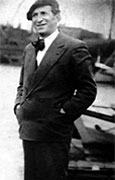
Juan de Dios Filiberto Rubaglio was born in Buenos Aires, on March 8, 1885. From an early age he studies and works as a brick layer, stevedore and lathe operator at the Mianovich shipyard, in La Boca. He actively participates in the local labor union movement.
Towards 1915, when he is 30 years old, he starts his musical studies. He attends classes with Celestino Piaggio and César Stiatessi to learn to read music, piano and violin. Later on he takes harmony classes with Rodríguez Castro, and is eventually admitted to the Conservatorio Nacional de Música de Buenos Aires, at the time directed by Alberto Williams. He perfects his piano before the careful watch of the maestro Fornarini and Williams himself.
A great admirer of Almafuerte (Bonifacio Palacios), he aligns himself behind whatever anarchistic social movement appears at the time, collaborating with the defense of the author rights and the protection Law 11.723, of the year 1933. He then creates a national association of composers, which is the present Sociedad Argentina de Autores y Compositores de Música (SADAIC). In 1936, he is formally registered as a "Founding Member”.
Composer and Director of Orchestra, great piano, guitar, violin and harmonium player –instrument which he used to compose most of his own repertoire– Filiberto is the author of the popular tango Caminito, dedicated to the short trail in La Boca that bears the same name. Among his other work we can find: Quejas de bandoneón, Cuando llora la milonga, Malevaje and Clavel del aire. Carlos Gardel records more than fifteen of his songs which become great hits in the Porteño music scene.
His career as official director of municipal and national orchestras starts with his "Orquesta Porteña", of which little documentation remains. In 1938 he directs the "Orquesta Popular de Arte Folklórico" and in 1948, the “Orquesta de Música Popular”, belonging to the National Ministry of Education, where his baton guides forty musicians. Towards 1956, this group plays under the name of "Orquesta de Música Argentina y de Cámara" and upon his death it becomes known as “Orquesta de Juan de Dios Filiberto de Música Argentina y de Cámara". Finally, and upon a presidential decree, in 1973 it is baptized again as the "Orquesta Nacional de Música Argentina Juan de Dios Filiberto ".
He dies on November 11, 1964, at the age of 79.